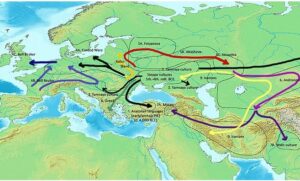Live Science reports that archaeologist Ludovic Slimak of the University of Toulouse and his colleagues suggest that three waves of modern humans migrated from the Levant into Europe between 54,000 and 42,000 years ago. It had been previously thought that modern humans first entered Europe 42,000 years ago, based upon the analysis of teeth unearthed in Italy and Bulgaria.
These people are considered to be the ancestors of Europe’s hunter-gatherer Aurignacian culture. But another recent study has dated a modern human tooth and small flint tools recovered at the site of Grotte Mandrin in southern France to 54,000 years ago, pushing the arrival of modern humans in Europe back some 10,000 years. Slimak compared these tools discovered in Europe with tools of similar age unearthed in the Levant, and found them to be similar. “I buil[t] a bridge between Europe and the East Mediterranean populations during the early migrations of sapiens in the continent,” he explained.
He also compared 45,000-year-old artifacts long thought to have been made by Europe’s Neanderthals with Early Upper Paleolithic artifacts from the Levant. He concluded that these objects could also have been crafted by modern humans who migrated into Europe from the Levant. “We have here, and for the first time, a serious candidate for a non-Neanderthalian origin of these industries,” Slimak claimed.
source archaeology.org
Ask me anything
Explore related questions





